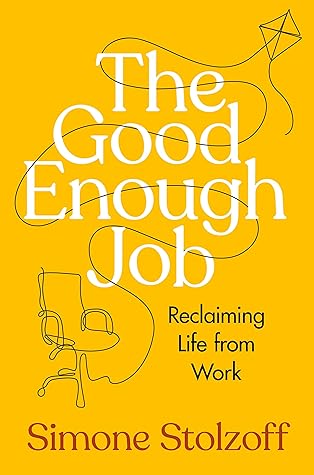More on this book
Community
Kindle Notes & Highlights
Read between
May 24 - May 25, 2023
The United States’ mantra might as well be “I produce, therefore I am.”
For Americans, “What do you do?” is often the first question we ask when we meet someone new.
A workist seeks meaning from their work similar to how a religious person seeks meaning from their faith.
I’ve spent my career searching for a vocational soulmate, for a job that doesn’t just pay the bills but is a unique reflection of who I am.
“People who love what they do, those people are blessed, man,” Hamza Taskeem, a cook who has worked in the same Pakistani restaurant for eighteen years, told me. “I just work to get by.”
There is a growing expectation that work ought to be a source of personal fulfillment and meaning.
“When work was dirty, less was more; now that it’s meaningful, more is better.”
the expectation that work will always be fulfilling can lead to suffering.
inflated expectations of professional success help explain record-high rates of depression and anxiety.
When we expect work to help us self-actualize—to constantly motivate and fulfill us—settling for anything less can feel like a failure.
how to balance the pursuit of meaningful work with the risk of letting your job subsume who you are.
Good enough is an invitation to choose what sufficiency means—to define your relationship to your work without letting it define you.
“Work will always be work. Some people work doing what they love. Other people work so that they can do what they love when they’re not working. Neither is more noble.”
“The life of the spirit requires less and less; time is ample and its passage sweet.”
too many people bring the best of themselves to work, and bring the leftovers home.
Meaning is not something that is bestowed upon us. It’s something we create. And as with any act of creation, it requires time and energy—the time to invest in nonwork pursuits and the energy to actually do so.
helped me define the role I wanted work to play in my life.
What we can control, however, are the expectations we place on our jobs. We can choose to subordinate work to life, rather than the other way around.
you aren’t what you do.
being among the best of the best was intoxicating. But the work was grueling.
No one had ever told her that before.
I was blinded by feeling so indebted to this person.”
“I didn’t know who I was without this job.”
when we invest, as Divya did, in different sides of ourselves, we’re better at dealing with setbacks.
If your identity is entirely tied to one aspect of who you are—whether it be your job, your net worth, or your “success” as a parent—one snag, even if it’s out of your control, can shatter your self-esteem.
losing your professional identity can be a shock to the system—especially
“I want to remind people that you have to create value outside of work to protect yourself,”
a work-centric existence leaves room for little else.
her job didn’t take up just her best hours, but her best energy, too.
We should diversify our identities because doing so allows us to be more well-rounded people.
Labor, then, was a divine calling—our toil sacred, even.
the deification of business executives.
work has become their primary source of meaning.
It didn’t feel like I was choosing between two jobs; it felt like I was choosing between two versions of me.
I loosened my grip on work and started to get back into my weekly routines.
At work, I tried to focus my attention on the aspects of my job that I enjoyed
I saw my job as good enough.
expecting a job to deliver transcendence creates a massive opportunity for disappointment.
the reward for professional success is often just more work.
it’s to remind us to hold values higher than commerce, even as we go about our days in a commercial world.
He is not just an academic, similar to how he is not just a Protestant, a father, a pastor, or a dude from a small town in Illinois; he is all of those things.
“Finding meaning from multiple parts of my life means that when a setback comes in one aspect, it doesn’t sting as much,”
the workplace is just one container with one definition for what makes a valuable life.
Your friends probably don’t value you based on your economic output.
people are more motivated and fulfilled when they determine what they value for themselves.
Loving—or even liking—what you did was not a priority.
“The problem with this gospel—your dream job is out there, so never stop hustling—is that it’s a blueprint for spiritual and physical exhaustion,”
“Do what you love and you’ll work super fucking hard all the time with no separation or any boundaries and also take everything extremely personally.”
ignores the tedium that exists in every line of work, blinds us to the flaws a dream job may have, and creates conditions in which workers are willing to accept less than they deserve.
People accepted that work was an obligation, and enjoyment was sold separately.


